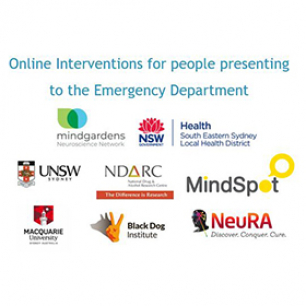This project will estimate the prevalence of chronic pain in people who attend emergency departments (ED) with suicidal behaviours or self-harm. It will also investigate the feasibility of offering information in the ED setting about online interventions for the treatment of chronic pain, depression and /or anxiety. Individuals attending ED with self-harm or suicidal behaviours will be offered the opportunity to self-enrol in a freely-available clinician-supported intervention for chronic pain, depression and /or anxiety delivered by the digital mental health service MindSpot.
This study will assess the extent to which offering information about these interventions in ED results in individuals self-referring to the service, and engaging in treatment. If providing information about the online interventions delivered by MindSpot demonstrates that it is feasible for people to self-enrol following attending ED, then this may justify routinely screening for pain among people presenting to ED with suicidal behaviours and routinely offering assistance to enrol in the online interventions following ED presentation for self-harm and suicidal behaviours. This pilot study aims to provide preliminary data to support examining these questions in a future national multi-site clinical trial.
Dr Gabrielle Campbell, University of the Sunshine Coast
Dr Swapnil Sharma, SESLHD
Prof Brian Draper, SESLHD
Dr Fiona Shand, Black Dog Institute
Ms Lesley Brydon, Independent Consultant
A/Prof James Macauley, NEURA
Dr Blake Dear, Macquarie University
Prof Nick Titov, Macquarie University
Prof Olav Nielssen, Macquarie University
Mr Mike Gatsi, SESLHD
People who live with chronic pain are more likely to take their own life, but it is not known what proportion of people who attend hospital experiencing a suicidal crisis are suffering from pain, or how treating the pain might influence their distress.
- To describe the demographics and clinical characteristics of people presenting to ED with suicidal behaviours or selfharm
- To determine the prevalence of chronic pain among people presenting to ED with suicidal behaviours or selfharm
- To determine whether it is feasible to refer individuals at time of discharge from ED to an online intervention delivered by the digital mental health service MindSpot
- To assess the proportion of individuals who self-refer, enrol in and complete an online intervention
- To gather qualitative feedback both from individuals who did not self-enrol (on their reasons for not doing so) and from individuals who did self-refer (on how they found the MindSpot intervention).
This pilot feasibility study will be conducted at Prince of Wales Hospital Emergency Department over a 6-month period during the COVID-19 pandemic. All individuals presenting to the ED with self-harm or suicidal behaviours will be assessed for symptoms of depression, anxiety and/or chronic pain via a screening tool that is completed by clinicians in ED. The UNSW research team will arrange two telephone interviews with the participant, the first within one week of discharge from ED and the second one month later to assess baseline characteristics and, at follow-up, information on whether the individual did or did not self-refer to MindSpot. Participants will be asked for qualitative feedback in the follow-up interview on how they found the MindSpot intervention or, if they did not enrol, the reasons why they did not enrol.
Screening, recruitment and interviews have been underway since the 10th August 2020. Screening and recruitment will continue until the 24th of February 2021 and follow-up telephone interviews will be completed by the end of March 2021.





